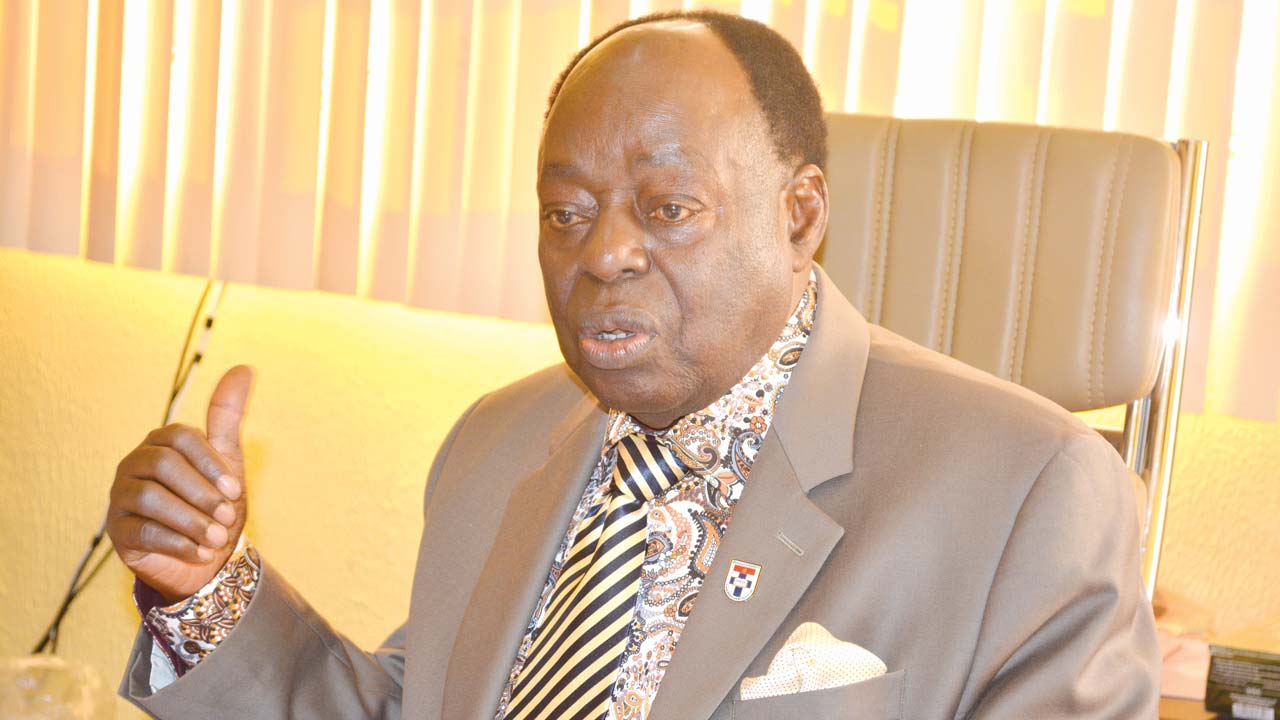
It was governor Adams Oshiomhole of Edo State, way back in November 2013, who told a female street trader in Benin City to ‘go and die’. In local parlance, ‘go and die’ could as well be ‘to hell with you’. That statement caused some rage in both virtual and real world, as citizens wondered what could have inspired the governor’s intemperate outburst. And what was the bone of contention, between the comrade governor and one of his citizens, whom he had sworn an oath to protect?
The woman, Mrs. Joy Ifije, who happened to be a widow, had spread her wares along a newly paved road in New Benin, and it happened that Oshiomhole was on inspection of the new facility that had just been commissioned, something like that. And the governor lost his cool and engaged the woman in some verbal brawl. But unknown to him, detractors were at a hearing distance. They did not just hear the governor take umbrage at a citizen, who was crestfallen at the behest of the number one citizen and her protector. They recorded the episode, and in no time it was trending in the social media. It went viral and Oshiomhole, who thought he was acting as the protector of public infrastructure, in line with the sanitation laws of the state became the villain, while Ifije, who had apparently violated the laws became the victim, and had to be handsomely compensated before some rights activists could instigate her to press huge charges.
Oshiomhole’s nose was bloodied, and were Edo, and the entire Nigerian polity to be in the league of advanced civil societies where public behaviour passes through in a high moral crucible, the governor would have been pressured to resign. But here, a lot of infractions can be monetized; just as plea bargain is canvassed for persons who had stolen the country blind. It became a contest between the governor and the opposition party who paid more to appease an otherwise law-breaker. The Peoples Democratic Party (PDP), quick to extort political capital from the governor’s blunder offered the woman some monetary compensation, but the governor, who is also the exchequer, offered more. He paid the woman N2m to save his neck, in addition to hiring her into the staff of War Against Indiscipline task force. A happy ending for a street trader you dare say?
In Kaduna State, after insurgents detonated bombs and killed 26 civil servants, and injured 32 others who had gone to do verification at Sabon Gari local government in July 2015, Governor Nasir el Rufai decided to outlaw street trading, street begging and other street activities that could be exploited by troublemakers to inflict harm. Some of us, particularly civil society activists, took up issues with the governor, insisting that government had no business legislating where people are to ply their trade, whether to beg, or trade. For an el Rufai, it was like taking on a familiar ‘enemy’ of the people, after all he had done in ‘cleaning’ and attempting to restore the original Abjua Master Plan. We thought Kaduna people should be spared the agony of hurried urbanization and its aftermaths.
In Imo State, Governor Rochas Okorocha is currently battling citizens who feel his urbanisation programme is an encroachment on their private space. But the government insists it must restore the state’s Master Plan, which was produced in 1976 when the state was created. Structures are being demolished, even as some had gone to court to stop the bulldozers from pulling down their fences located along Orlu Road. The government appears unstoppable and there is collateral damage everywhere.
All over the country; states are up in arms, trying to enforce some level of compliance in urban renewal schemes. In some places, there is resistance, in others, both sides have reached some understanding and compensations are paid. In Ogun State for example, the present government has redesigned the face of the state capital, Abeokuta. Many old and new structures have been pulled down and there is now a new lease of life for all. Traffic flows better and owners of affected structures were reportedly compensated.
Of the many face-offs between citizens and state governments’ drive to renew or reconstruct their state capitals and other urban centres, that of Lagos State receives far more hearing and critiques. Lagos is the centre of excellence, the richest state and Nigeria’s business capital. Lagos is the window into the country, from the air sea and virtual. Lagos absorbs all excesses, both good and bad from all states of the federation. If Lagos is poorly profiled and stigmatised, it affects the country and all of us.
In November 2015, The Economist of London featured a report of the redoubled traffic chaos of Lagos at that time, when the new government of Akinwunmi Ambode was struggling to find its feet. Titled, ‘Urban Traffic Paralysed’ the report, apparently intended as a back of the book commentary, or mere travelogue suddenly became a political metaphor that sent all concerned scampering to make rebuttals. The report tried to find why traffic in Lagos had become so dense and sterile. It blamed the situation on present day inertia, unlike when Babatunde Fashola was more forceful. It alleged that the new government had stripped traffic control authorities of their powers and enthroned lawlessness. The Economist then labeled Lagos as one of the ‘notoriously congested places in the world.”
Before then, the international media had variously profiled Lagos as one of the filthiest places on earth, even when Fashola was in charge. Therefore, Lagos is simply not ordinary because it might be a (mis)representation of who we are, in terms of social beaviour. If Lagos is chaotic, the tendency is that some people out there will see it as part of the Nigerian nature. If it is filthy, it could be adduced as a carry over of the corruption malaise. The Economist said that much. Therefore, Lagos cannot be abandoned in the common rung. No serious chief executive will sit down and watch Lagos go down the drain. Yet, there can be no Lagos without the people.
Generally, the democratic space since 1999 has not been well apportioned to allow ordinary Nigerians feel a part of the whole and do their best to promote good and decent public culture. Even when leaders mean well, their body language and delivery connote totalitarianism. And that’s off-putting and people begin to see the political leadership as enemy. The Edo episode mentioned earlier is a good example. Here was a governor, whose concept of public infrastructure had been well commended. But it was not his brief to descend into the arena to enforce sanitation laws. The same Oshiomhole had earlier at some remote location embarrassed some teachers, when upon an unannounced inspection he came up with the theory that they could not speak English. The point is that a civilian governor is not an emperor. He is a servant of the people, and that should be transmitted to the people at all the times, so that they may begin to see him and what he stands for as their own.
The laws that are made by the legislative houses should have the people in focus. Sanitation laws, and indeed all other laws passed in the states are hardly debated, because the legislative houses are lazy and too ready to endorse and rubber-stamp whatever governors bring to them. The Lagos sanitation law, in the face of current challenges should be revisited and debated, so that the contumacious human rights community will be on hand to advance interests of street traders and how to accommodate them. Just as governments in Lagos and everywhere cannot abandon the streets to traders and other social miscreants, citizens should be made to feel a part of the government and develop the attitude to protect public laws and infrastructure.
The point had been made severally about what should be done to assist Lagos in welcoming other Nigerians, who are daily running away from poverty in their states to seek accommodation in Lagos. Some of these people have no skills, apart from selling along the streets. Nigeria must insist on basic education for all children of school age. The National Assembly has a role to play, to make a case for Lagos to be supported from the Federation Account. That is if we must continue to operate this opaque and unfair federal structure.






